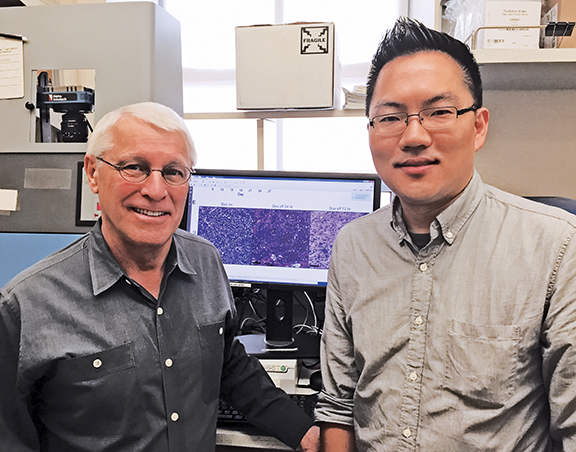March 31, 2016 – A protein called N-Myc that is overexpressed in neuroendocrine prostate cancer (NEPC) may actually drive its progression, and its disruption causes a reduction in tumor growth, reports a new study by Lori Milken – PCF Young Investigator John Kyung Lee, MD of the University of California, Los Angeles.
 Dr. Owen Witte (left) and Dr. John Lee
Dr. Owen Witte (left) and Dr. John Lee
There is currently no cure for NEPC, a lethal, advanced form prostate cancer that affects up to 25% of men with treatment-resistant disease.
These groundbreaking results were published online today in the journal Cancer Cell.
“What we need are new targets for NEPC, because without these, there can’t be any new treatments,” says Dr. Lee. “By identifying new targets like N-Myc, and others, we can focus on the development of new therapeutics and bring new treatment options to the clinic.”
Commenting on this study, Dr. Jonathan W. Simons, MD, president and CEO, Prostate Cancer Foundation said, “Dr. Lee’s remarkable discovery offers important insight in how to generate lasting remissions in this vicious form of prostate cancer. Work like this exemplifies why our Young Investigator Awards are so valuable to the scientific community.”
NEPC is a highly aggressive disease that can proliferate in the absence of male hormones—the fuel that normally drives the growth of prostate tumors. Currently, men with NEPC are treated with chemotherapy; however, this systemic therapy carries a number of harmful side effects and only produces modest gains in survival time, which is generally less than one year.
Dr. Lee says that the main challenge for studying NEPC is a lack of tumor models that can be studied in the laboratory. Inspired by the work of PCF researchers Himisha Beltran, MD and Mark Rubin, MD, who study patients diagnosed with NEPC, he wanted to evaluate the role that abnormally abundant molecules like N-Myc have on NEPC initiation and progression.
Working under the mentorship of Owen Witte, MD, founding director of theUCLA Broad Stem Cell Research Center, and the senior author on the study, Dr. Lee found that invasive metastatic tumors that resembled NEPC could be generated “from scratch” by expressing high levels of N-Myc along with a second activated oncogene called AKT in normal prostate cells. As a PCF YI, Dr. Lee was also able to connect directly with Drs. Beltran and Rubin, who shared data from NEPC tumors they had collected from patients. Using these data, Dr. Lee was able to confirm that the tumors he had generated just by expressing these two genes had features of clinical NEPC.
Working with his new models, Dr. Lee discovered that if he deleted N-Myc from the tumors, they regressed rapidly. Furthermore, treatment with an inhibitor of Aurora Kinase A, a protein that keeps N-Myc from breaking down, was effective against the NEPC-like tumors. A similar compound called MLN8237 is now being tested in a phase II clinical trial led by Dr. Beltran.
While still some time from the clinic, Dr. Lee’s results provide the basis for a new, precision treatment strategy for men with NEPC that could serve as an alternative to chemotherapy. This could help men with the worst forms of prostate cancer avoid unnecessarily harsh treatments, and live longer, better lives.
Read the full press release here.









